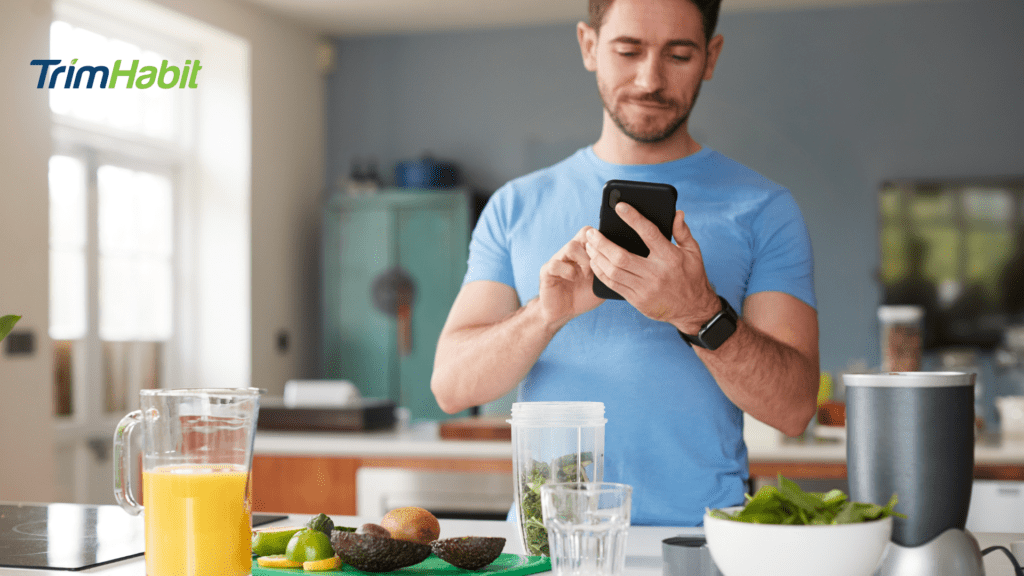Bloating is one of the most common side effects people notice after starting semaglutide. If meals seem to sit in your stomach too long or leave you feeling swollen and uncomfortable, your food choices may be part of the issue. The good news is that this can be managed. Choosing the right foods makes a real difference in how your body responds.
In this guide, we’ll look at anti-bloating foods to eat while taking semaglutide, which are easier to digest, more supportive of your blood sugar, and better suited for the slower digestion this medication causes. Whether you’re just starting treatment or adjusting to its effects, these strategies can help you eat comfortably while continuing to move toward your weight loss goals.
Understanding Why Semaglutide Causes Bloating
Semaglutide is a GLP-1 receptor agonist, a type of weight loss medication that mimics a natural hormone produced in the gut. One of its effects is delayed gastric emptying, which means food stays in your stomach longer. While this helps stabilize blood sugar and reduce appetite, it can also make meals feel like they sit for too long. This slower movement can lead to gas buildup, stomach pain, and uncomfortable bloating1,2.
Pairing the medication with anti-bloating foods helps ease these symptoms and improves your chances of successful weight loss. It is not just about comfort. Better digestion means better energy, fewer side effects, and more consistency with your eating habits.
Focus On Gentle, Nutrient-Dense Foods
When digestion slows, you want to avoid meals that are heavy, greasy, or hard to break down. Nutrient-dense foods that offer vitamins, minerals, and fiber in an easier-to-digest form can support your digestive system without overwhelming it.
These include cooked vegetables, soft fruits, lean protein, and foods with healthy fats. A small portion of roasted sweet potato with steamed spinach and grilled fish is one example of a balanced meal that supports blood sugar regulation while minimizing bloat.
Lean Proteins And Soft Cooking Methods
Lean protein sources like chicken breast, tofu, eggs, or white fish are easier to digest than fattier cuts or processed meats. These protein-rich foods help preserve muscle mass, especially when you are losing weight, and they support a healthy eating pattern that works with semaglutide. Cooking them gently, by steaming, baking, or grilling, makes them less likely to trigger discomfort.
Be cautious with protein intake that comes from fried foods or high-fat foods like sausage or deep-fried meats. These slow digestion even more and can increase bloating and nausea.
Choose Cooked, Non-Starchy Vegetables
Raw vegetables are often too fibrous for slowed digestion. Instead, go for cooked, non-starchy vegetables like steamed carrots, sautéed zucchini, or roasted bell peppers. These are among the best foods to eat when bloating is a concern because they retain fiber and nutrients without causing gas or heaviness.
Leafy greens are also helpful, but they should be lightly cooked to reduce the chance of bloating. A small bowl of sautéed spinach with olive oil and garlic supports both digestion and blood sugar control without making your stomach feel tight or overfilled.
Incorporate Low Glycemic, High Fiber Foods
When choosing carbohydrates, focus on low glycemic foods that do not spike blood sugar levels. These include brown rice, oats, and certain fruits and vegetables. Brown rice, in particular, provides energy without overwhelming your digestive tract and supports blood sugar management in a steady, predictable way.
You do not need to eliminate carbs entirely. Eating foods that are high in soluble fiber, such as oats or squash, helps slow digestion gently and supports long-term weight management without irritating your system. Just remember to eat fiber-rich foods in cooked or softened forms when possible.
Support Your Gut With Gentle Whole Grains
Whole grains like barley, farro, and wheat bread (in small amounts) can support digestion, especially when eaten in cooked and softened forms. These grains offer fiber and B vitamins that promote energy and gut health. However, portion control is key. When digestion slows, large servings of grains, even whole ones, can be too heavy.
A quarter cup of cooked farro with roasted vegetables and lean chicken is an example of a meal that feels satisfying without overwhelming your system.
Limit High Sugar And Ultra-Processed Foods
High-sugar and ultra-processed foods are common culprits when it comes to bloating. They ferment quickly in the gut, producing excess gas and triggering inflammation. These include sugary cereals, baked goods, and sweetened snacks. These foods also undermine blood sugar regulation and can disrupt your progress on semaglutide.
Instead, focus on nutritious foods that help stabilize blood sugar levels throughout the day. Examples include roasted vegetables, legumes, berries, and small portions of whole grains. These choices nourish your body without triggering the digestive discomfort that often follows processed meals.
Watch Out For Spicy And Fried Foods
Spicy foods can irritate the digestive tract, especially when semaglutide is slowing movement through your system. If you find yourself bloated after meals with chili, garlic, or hot sauce, consider switching to milder seasonings like fresh herbs, lemon juice, or turmeric. Fried foods should also be limited, as they combine saturated fats and heavy oils that can weigh down your stomach and contribute to bloating or stomach pain.
Both spicy foods and greasy meals slow digestion and can reduce your tolerance for eating altogether. Choosing lighter meals makes it easier to stay consistent with your treatment and avoid unnecessary discomfort.
Stay Hydrated Without Sugary Drinks
Proper hydration helps fiber move through your system and keeps digestion running smoothly. Instead of sugary drinks or energy drinks, which can spike blood sugar and cause water retention, try herbal tea or plain water with lemon. Warm liquids can help reduce bloating by relaxing the digestive tract and preventing constipation.
Low-fat dairy, such as plain Greek yogurt or cottage cheese, can also offer hydration, protein, and probiotics in a form that supports gut health. These are often better tolerated than full-fat or sweetened dairy products, which may increase bloating and disrupt blood sugar control.
Balance Meals To Support Long-Term Comfort
A healthy diet that reduces bloating includes fiber, lean protein, and healthy fats in the right amounts. A balanced diet also means keeping portions moderate, chewing thoroughly, and taking your time. People who eat slowly tend to feel less bloated and are more in tune with their body’s hunger and fullness signals.
For example, a meal of grilled salmon, roasted zucchini, a small serving of quinoa, and half an avocado is nutrient-dense, balanced, and less likely to upset your stomach. It supports your body weight goals without relying on refined carbohydrates or unhealthy fats.
Anti-Bloating Foods To Eat While Taking Semaglutide
1. Grilled Salmon with Steamed Zucchini and Quinoa
Salmon provides lean protein and healthy fats, while zucchini is a non-starchy vegetable that’s easy to digest. Quinoa offers gentle fiber and is less likely to cause bloating compared to wheat-based grains.
2. Chicken and Vegetable Stir-Fry with Brown Rice
Use skinless chicken breast with sautéed bok choy, carrots, and bell peppers. Keep the seasoning mild (avoid garlic and onion if you’re sensitive). A small portion of brown rice adds fiber without overloading your digestive system.
3. Turkey Lettuce Wraps with Avocado and Cucumber
Ground turkey, lightly seasoned, wrapped in romaine or butter lettuce leaves, paired with slices of avocado and cucumber. This low-carb meal is refreshing, rich in potassium, and great for easing bloating.
4. Egg and Spinach Scramble with a Side of Papaya
Eggs provide protein without bulk, and spinach is a gentle leafy green that supports digestion. Papaya contains natural enzymes that may help reduce bloating and aid gastric emptying.
5. Tofu and Miso Soup with Soft-Cooked Vegetables
Silken tofu is easy to digest and adds protein without heaviness. Miso broth and vegetables like soft carrots, mushrooms, and spinach help keep this meal warm, light, and satisfying.
6. Baked Cod with Roasted Fennel and Carrot Puree
Cod is a low-fat, protein-rich fish that doesn’t weigh you down. Fennel can help reduce gas and bloating, while carrot puree provides a gentle, slightly sweet starch alternative.
Foods To Limit Or Avoid When Bloating Is A Concern
Certain foods are more likely to trigger bloating when paired with semaglutide. These include:
- Refined carbohydrates like white bread and pasta
- Sugary drinks such as soda or sweetened coffee
- Fried or fast food meals
- High fat dairy products
- Foods high in saturated fats
- Gassy vegetables like raw cauliflower or cabbage
Limiting these foods can support better blood sugar management and reduce discomfort after meals. Eating smaller meals with fewer bloating triggers makes it easier to maintain lean muscle mass and stick to your weight loss journey.
Make Your Meals Work For You
Meal timing and preparation are just as important as food choices. When you space out meals and eat at regular times, your body has a better chance to digest food without becoming backed up or sluggish.
You do not need to follow a rigid eating schedule, but try not to go too long without eating either. Long fasting periods followed by large meals are more likely to cause bloating, especially when taking a medication that slows digestion.
Try building your meals around the following structure:
- One to two servings of cooked vegetables
- One lean protein source
- A small portion of whole grains or fiber
- A healthy fat like avocado, nuts, or olive oil
This kind of plate keeps your energy steady and supports your digestive system without discomfort.
Practical Habits That Reduce Bloating
Beyond food, your habits can reduce or worsen bloating. Chewing thoroughly, eating in a calm environment, and sitting upright after meals can all help. Walking for ten to fifteen minutes after dinner can also stimulate digestion and reduce that swollen, overfull feeling.
Avoid eating quickly, lying down right after meals, or consuming large quantities of fluids with food. These behaviors can trap air in your digestive system and lead to gas or bloating. Adopting a calm, mindful approach to meals helps support a healthy lifestyle that works well with semaglutide.
Looking At The Bigger Picture
Your food choices affect not only how you feel but also how you progress with your weight management. If your meals are constantly making you feel bloated or uncomfortable, you are less likely to stay consistent, and that can lead to weight regain. On the other hand, building meals that support digestion and blood sugar control helps preserve muscle mass, improve energy, and make weight loss more sustainable.
Working with a registered dietitian or clinical nutrition expert can help personalize your plan. They can help you identify certain foods that your body does not tolerate well, especially when dealing with the slower digestion linked to semaglutide.
Conclusion
Semaglutide changes how your digestive system functions, and it is common to experience some discomfort, especially early in treatment. But bloating does not need to be your new normal. Choosing the right ingredients and being mindful about how you prepare and eat your meals can make a noticeable difference.
By focusing on anti-bloating foods to eat while taking semaglutide, you improve comfort, support your digestion, and help your body adapt to treatment in a healthy and sustainable way. Eating with care helps you stay on track with your goals and keeps your body feeling strong, light, and balanced along the way.









